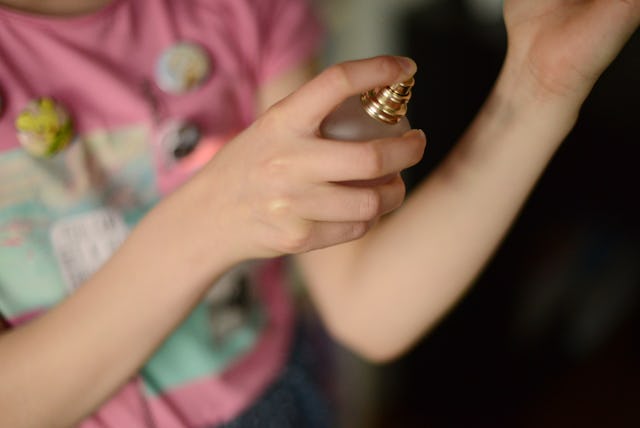So Your Tween Is Asking For Their First Signature Fragrance
A dermatologist explains how to find perfumes and colognes safe for young skin.

The time has come: your tween is asking for you to take them shopping for a signature scent. Maybe they saw a TV character spritzing on some cologne before heading out the door, or a classmate came to school smelling like a cupcake and they want to do the same now. It’s normal (and healthy!) for kids to develop their own sense of style and self at this age. But is it OK for kids to wear perfume or cologne? Aside from picking out an age-appropriate scent — no one wants to send their sixth grader to school smelling like Black Opium — should you be saying no to certain ingredients in your kids’ fragrances?
Is it OK for kids to wear perfume or cologne?
Yes, but you’ll want to be particular about what kind. “Some colognes and perfumes do contain ingredients that aren’t the safest for kids, especially things like phthalates, which are used to make scents last longer but can potentially disrupt hormones,” says dermatologist Dr. Dara Spearman. “You also want to be cautious with synthetic musks, strong essential oils, and anything with a lot of alcohol, since they can cause irritation or allergic reactions on young skin.”
You might be extra wary if your child has sensitive skin, and that’s warranted, Spearman says. “For kids with sensitive skin, wearing fragrance can sometimes trigger irritation, rashes, or even breakouts, so it’s really important to be selective.”
How to choose a safe perfume or cologne for kids
Check that ingredient label.
It can be hard to tell if a perfume or cologne has phthalates in their formula; Spearman says they’re often listed as just “fragrance” on the ingredient label. She recommends shopping for a product that is free from phthalates, dyes, parabens, and alcohol (to the best of your ability). Those are the ingredients responsible for disrupting hormones and irritating the skin. You could also look for fragrances that are labeled as hypoallergenic or formulated for sensitive skin.
“Introducing your child to safe perfumes and colognes is a great way to teach them to read labels and use products responsibly which sets the foundation for healthy habits early on,” Spearman says.
Steer them toward a body spray over a true cologne or perfume.
“These are gentler on young skin and less overwhelming in scent, which is especially important in shared spaces like classrooms,” Spearman says. “Fragrance strength matters too. Tweens don’t need a scent that lingers for hours. Something subtle and fresh is ideal.”
Use it sparingly.
Teach your child to spray the fragrance on their clothing instead of directly onto their skin, Spearman says. Kids with very sensitive skin might even try spraying the product onto their backpack or a hat. This still allows them to experiment and enjoy the experience while minimizing the risk of irritation.
Do a patch test.
Even if your tween doesn’t have sensitive skin, Spearman recommends they do a patch test — meaning, apply a small amount of the perfume in one small area of their skin and watch it for 24 hours to make sure they don’t have a reaction before they douse themselves all over.
Choose products made specifically for younger users.
“There are a lot of clean, age-appropriate brands now that make safe and fun options for tweens who are just starting to explore personal care,” says Spearman.
Brands that hit some of these marks include the Good Chemistry body mists, Clean Age body sprays, JB Skrub sprays, and DAISE fragrances.
Whatever your child wants to smell like, hopefully now you and your kid choose you feel good about.